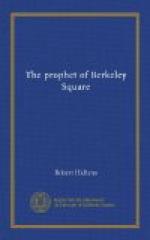“What was dressed?”
“What! why, the Crab!”
“The Crab—dressed!”
“Ay. They’re a deal safer not dressed.”
“Are they?”
“She knows it too.”
“Does she?”
“But there—them women likes a spice of danger. She’s in a nice state now, you bet. Not much sleep for her, I’ll lay. Well, I tried to keep her from it, so you needn’t blame me.”
“I won’t,” said the Prophet, feeling completely dazed.
“Well, go’-night. I’m off round the square.”
“Good-night,” said the Prophet.
Suddenly a blinding flash of light dazzled his eyes. He covered them with his hands. When he could see again the blot was gone.
Although he was retired to rest that night when the clock struck three, the Prophet did not sleep. His nervous system was in a condition of acute excitement. His brain felt like a burning ball, and the palms of his hands were hot with fever. For the spirit of prophecy was upon him once more, and he was bound fast in the golden magic of the stars. Like the morphia maniac who, after valiant fasting, returning to his drug, feels its influence the stronger for his abstinence from it, the Prophet was conscious that the heavens held more power, more meaning for him because, for a while, he had intended to neglect them. He was ravaged by their mystery, their majesty and revelation.
When he came down in the morning pale, dishevelled, but informed by a curious dignity, he was met at once by Mr. Ferdinand.
“I have cleared the area, sir,” said the functionary.
“The area, Mr. Ferdinand. What of?”
“Telegrams, sir. The boys must have thrown ’em down without knocking.”
“Very probably,” replied the Prophet. “Their comrade was right. They did not wish to be strangled.”
“No, sir. And I have placed them in a basket on the breakfast table, sir, while awaiting your orders.”
“Quite right, Mr. Ferdinand. By the way, here is the bradawl. Leave it out again to-night in case I have need of it.”
So saying, the Prophet handed the bradawl, which he had craftily conveyed from the pantry on the previous night, to the astonished butler and walked swiftly into the breakfast-room. The basket of telegrams was set outside beside a fried sole and the “equipage” which Madame had so much admired, and, while he sipped his tea, the Prophet opened the wires one by one. They were fraught with terror and dismay. Evidently his mysterious warning had thrown the worthies who dwelt beside the Mouse into a condition of the very gravest amazement and alarm, and they had, despite the Prophet’s final injunction, spent the remaining telegraphic hours of the day in despatching wires of frantic inquiry to the square. Madame, in particular, was evidently much upset, and expressed her angry agitation in a dead language that seemed positively to live again in fear and novelty of grammatical construction. Sir Tiglath had been a brilliant card to play in the prophetic game, although he had not achieved the Prophet’s purpose of stopping the telegraphic flood.




